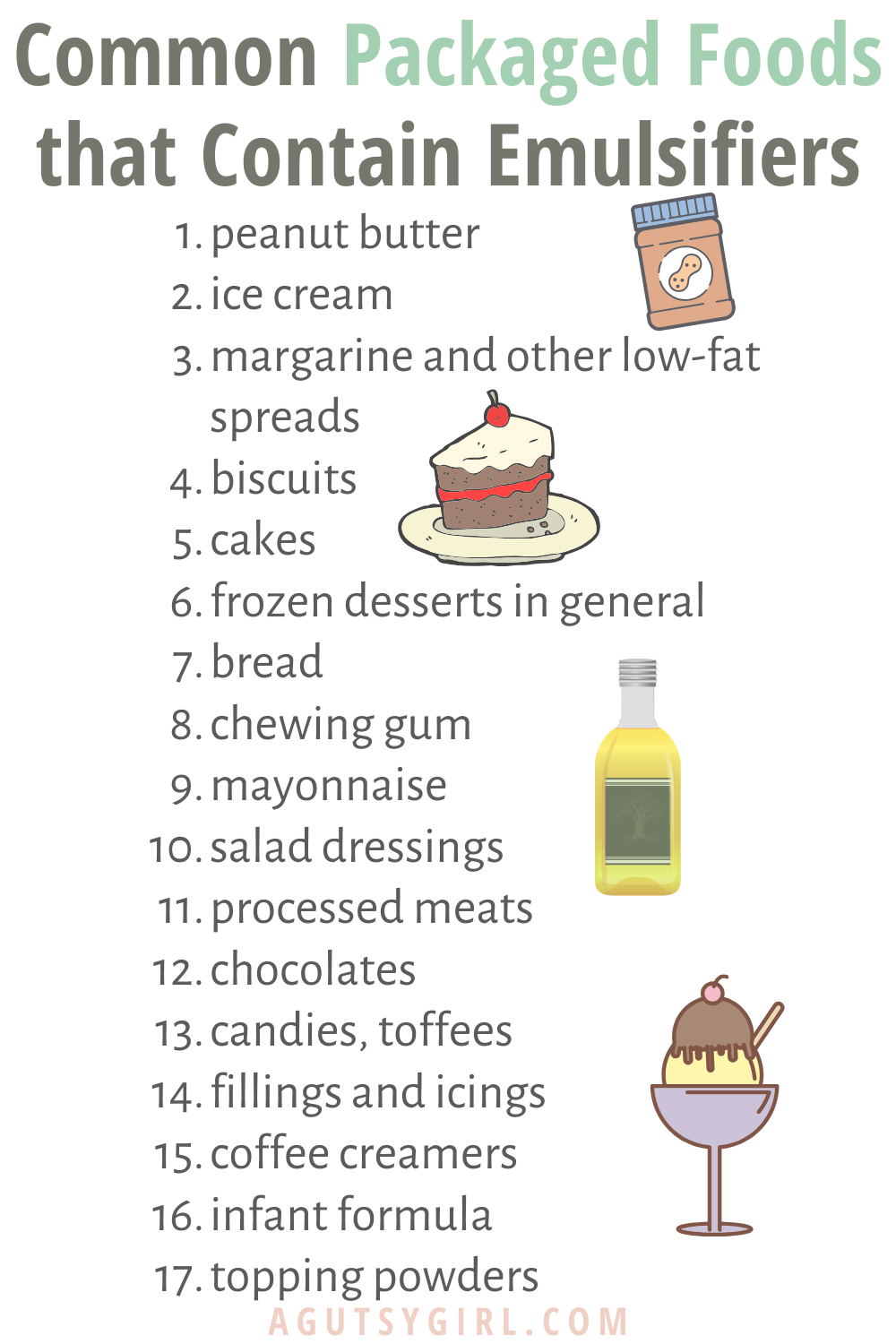Understanding Emulsifier In Food for Food Scientists
Wiki Article
Everything about the Function of an Emulsifier in Food and Its Importance in Modern Food
Emulsifiers are essential in modern food, helping with the mix of immiscible liquids like oil and water. Their capability to support combinations boosts the structure and taste of numerous food items. From salad dressings to baked products, emulsifiers play a considerable function in both business and home cooking. The scientific research behind their function and the future technologies in their use remain much less checked out. What more could be unearthed about these necessary cooking representatives?Understanding Emulsification: The Science Behind the Process
Although emulsification may appear like a basic cooking method, it includes complex scientific concepts that are essential for developing stable mixes of immiscible liquids, such as oil and water. At the heart of this process lies the concept of surface tension, which avoids both liquids from mixing naturally. Emulsifiers, compounds that minimize surface area stress, play an important function in promoting the combination of these fluids. They possess both hydrophilic (water-attracting) and hydrophobic (water-repelling) buildings, enabling them to secure themselves at the interface in between oil and water.When an emulsifier is introduced and the mixture is agitated, it develops a safety barrier around distributed droplets of one liquid within the various other, stabilizing the combination. This action not only boosts texture and mouthfeel in food however additionally adds to their aesthetic allure. Emulsifier In Food. Comprehending the scientific research behind emulsification is basic in contemporary food, allowing cooks to produce a range of sauces, dressings, and emulsified meals
Common Sorts Of Emulsifiers Used in Food
Emulsifiers are vital active ingredients in the food sector, playing an important duty in stabilizing mixtures of oil and water. Different kinds of emulsifiers are frequently made use of, each with one-of-a-kind homes fit for various applications. Lecithin, originated from soybeans or egg yolks, is just one of one of the most preferred all-natural emulsifiers, usually located in dressings and delicious chocolates. Mono- and diglycerides, which are originated from glycerol and fats, are commonly utilized in baked items and margarine to boost texture and extend life span. One more typical emulsifier is polysorbate 80, preferred for its ability to improve the uniformity of gelato and sauces. Additionally, xanthan gum tissue and guar gum offer as thickening agents that likewise contribute to emulsification in gluten-free items. These emulsifiers are indispensable to developing a steady, palatable product in contemporary food solutions, guaranteeing a positive sensory experience for consumers.
The Role of Emulsifiers in Different Food Products
A selection of food count on emulsifiers to accomplish desired textures and stability. These substances assist in the mixing of immiscible fluids, such as oil and water, which is important in many refined foods. As an example, in salad dressings, emulsifiers assist keep a constant mixture, stopping splitting up and enhancing shelf life. In baked items, they add to a consistent crumb structure and dampness retention, boosting general quality.Emulsifiers likewise play a significant function in milk products, such as ice cream and yogurt, where they stabilize fat blobs, ensuring a smooth mouthfeel. Additionally, in sauces and dressings, they enhance viscosity and enhance spreadability. This capability is vital in the production of delicious chocolates, margarine, and mayonnaise, where a cohesive product is essential. Overall, using emulsifiers in various food is important to modern food manufacturing, improving security and uniformity across a vast array of things.
How Emulsifiers Enhance Texture and Flavor

When incorporated into foodstuff, emulsifiers considerably enhance both structure and taste, developing a more pleasurable eating experience. go to website These substances promote the mixing of ingredients that typically do not mix well, such as oil and water, resulting in a smoother, creamier consistency. This not just improves mouthfeel however also enables tastes to distribute evenly throughout the item, intensifying the overall taste.

Emulsifiers in Home Food Preparation: Tips and Techniques
How can home chefs properly make use of emulsifiers to enhance their dishes? Emulsifiers play an important function in accomplishing desirable textures and tastes in homemade recipes. Using egg yolks in mayonnaise or hollandaise sauce permits for a stable solution, combining oil and water properly. Home cooks can likewise trying out mustard, which works as an emulsifier in vinaigrettes, making certain a smooth uniformity.In cooking, integrating lecithin, discovered in egg yolks or soy, can improve dough security and wetness retention. In addition, utilizing industrial emulsifiers like xanthan gum tissue or guar gum tissue can help enlarge sauces and dressings while keeping a creamy mouthfeel.
When producing gelato or whipped garnishes, emulsifiers can stop ice crystal formation, leading to a smoother appearance. By understanding these strategies, home cooks can greatly elevate their culinary productions, providing enjoyable and constant dishes that display the power of emulsification.
The Future of Emulsifiers in Culinary Development
As the cooking world proceeds to advance, the function of emulsifiers is positioned to come to be progressively innovative and diverse. Advancements in food scientific research are causing the advancement of brand-new emulsifying agents derived from natural resources, which satisfy health-conscious consumers and improve the sensory qualities of recipes. Technologies such as plant-based emulsifiers are getting grip, permitting chefs to produce vegan and allergen-free choices without endangering structure or flavor.Furthermore, making use of emulsifiers in molecular gastronomy is broadening, enabling cooks to try out unique appearances and presentations that captivate restaurants. As sustainability comes to be a priority, the future might see a change towards environmentally friendly emulsifiers that decrease ecological influence.
Ultimately, emulsifiers will remain to play an important duty in culinary technology, bridging the void in between tradition and modernity, and allowing cooks to push the borders of creative thinking in their cooking areas.
Regularly Asked Questions

Are Emulsifiers Safe for People With Allergies?
Emulsifiers can be risk-free for people with allergic reactions, relying on their certain level of sensitivities. Certain emulsifiers, obtained from allergenic resources like soy or eggs, may set off reactions, necessitating mindful ingredient scrutiny and consultation with healthcare experts.Just How Do Emulsifiers Affect Food Shelf Life?
Emulsifiers boost food service life by stabilizing mixtures, protecting against separation, and lowering microbial growth. This security assists maintain texture and flavor with time, enabling products to remain safe and enticing for web usage much longer than without emulsifiers.Can Emulsifiers Be Derived From Natural Resources?
Yes, emulsifiers can be acquired from natural sources such as plants, eggs, and dairy items (Emulsifier In Food). These all-natural emulsifiers aid maintain mixes, boosting texture and uniformity in numerous food applications while being preferred for health-conscious customersWhat Are the Ecological Effects of Emulsifier Manufacturing?
The environmental effects of emulsifier manufacturing consist of resource depletion, environment devastation, and pollution from artificial processes. All-natural emulsifier sourcing can mitigate some impacts, yet in general, industrial practices still present significant eco-friendly challenges to environments worldwide.

Are There Vegan Emulsifiers Available in the Market?
Yes, there are several vegan emulsifiers available in the market, such as lecithin derived from soy or sunflower, guar periodontal, and xanthan gum. These choices satisfy plant-based diets without endangering emulsifying properties.Emulsifiers are essential ingredients in the food market, playing an important duty in maintaining blends of browse around this site oil and water. A range of food products count on emulsifiers to attain wanted appearances and stability. When integrated right into food products, emulsifiers significantly boost both appearance and flavor, producing a more pleasurable consuming experience. Furthermore, emulsifiers can support air pockets in whipped products like lotions and mousses, leading to a light and airy structure. Emulsifiers improve food shelf life by maintaining blends, preventing splitting up, and minimizing microbial growth.
Report this wiki page